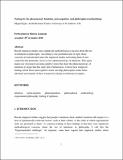Testing for the phenomenal : intuition, metacognition, and philosophical methodology
Abstract
Recent empirical studies raise significant methodological concerns about the use of intuitions in philosophy. According to one prominent line of reply, these concerns are unwarranted since the empirical studies motivating them do not control for the putatively characteristic phenomenology of intuitions. This paper makes use of research on metacognitive states that share the phenomenology of intuitions to argue that this reply fails. Furthermore, it shows how empirical findings about these metacognitive states can help philosophers make better informed assessments of their warrant for relying on intuitions in inquiry.
Citation
Egler , M 2020 , ' Testing for the phenomenal : intuition, metacognition, and philosophical methodology ' , Mind & Language , vol. 35 , no. 1 , pp. 48-66 . https://doi.org/10.1111/mila.12229
Publication
Mind & Language
Status
Peer reviewed
ISSN
0268-1064Type
Journal article
Collections
Items in the St Andrews Research Repository are protected by copyright, with all rights reserved, unless otherwise indicated.

